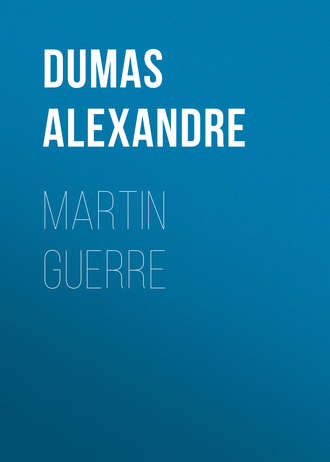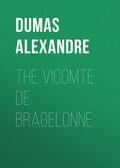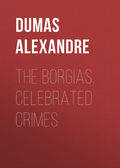
Александр Дюма
Martin Guerre
Pierre Guerre, indeed, was simply a thorough egotist. In his youth he had been charged with usury; no one knew by what means he had become rich, for the little drapery trade which he called his profession did not appear to be very profitable.
After his nephew’s departure it seemed only natural that he should pose as the family guardian, and he applied himself to the task of increasing the little income, but without considering himself bound to give any account to Bertrande. So, once persuaded that Martin was no more, he was apparently not unwilling to prolong a situation so much to his own advantage.
Night was fast coming on; in the dim twilight distant objects became confused and indistinct. It was the end of autumn, that melancholy season which suggests so many gloomy thoughts and recalls so many blighted hopes. The child had gone into the house. Bertrande, still sitting at the door, resting her forehead on her hand, thought sadly of her uncle’s words; recalling in imagination the past scenes which they suggested, the time of their childhood, when, married so young, they were as yet only playmates, prefacing the graver duties of life by innocent pleasures; then of the love which grew with their increasing age; then of how this love became altered, changing on her side into passion, on his into indifference. She tried to recollect him as he had been on the eve of his departure, young and handsome, carrying his head high, coming home from a fatiguing hunt and sitting by his son’s cradle; and then also she remembered bitterly the jealous suspicions she had conceived, the anger with which she had allowed them to escape her, the consequent quarrel, followed by the disappearance of her offended husband, and the eight succeeding years of solitude and mourning. She wept over his desertion; over the desolation of her life, seeing around her only indifferent or selfish people, and caring only to live for her child’s sake, who gave her at least a shadowy reflection of the husband she had lost. “Lost – yes, lost for ever!” she said to herself, sighing, and looking again at the fields whence she had so often seen him coming at this same twilight hour, returning to his home for the evening meal. She cast a wandering eye on the distant hills, which showed a black outline against a yet fiery western sky, then let it fall on a little grove of olive trees planted on the farther side of the brook which skirted her dwelling. Everything was calm; approaching night brought silence along with darkness: it was exactly what she saw every evening, but to leave which required always an effort.
She rose to re-enter the house, when her attention was caught by a movement amongst the trees. For a moment she thought she was mistaken, but the branches again rustled, then parted asunder, and the form of a man appeared on the other side of the brook. Terrified, Bertrande tried to scream, but not a sound escaped her lips; her voice seemed paralyzed by terror, as in an evil dream. And she almost thought it was a dream, for notwithstanding the dark shadows cast around this indistinct semblance, she seemed to recognise features once dear to her. Had her bitter reveries ended by making her the victim of a hallucination? She thought her brain was giving way, and sank on her knees to pray for help. But the figure remained; it stood motionless, with folded arms, silently gazing at her! Then she thought of witchcraft, of evil demons, and superstitious as every one was in those days, she kissed a crucifix which hung from her neck, and fell fainting on the ground. With one spring the phantom crossed the brook and stood beside her.
“Bertrande!” it said in a voice of emotion. She raised her head, uttered a piercing cry, and was clasped in her husband’s arms.
The whole village became aware of this event that same evening. The neighbours crowded round Bertrande’s door, Martin’s friends and relations naturally wishing to see him after this miraculous reappearance, while those who had never known him desired no less to gratify their curiosity; so that the hero of the little drama, instead of remaining quietly at home with his wife, was obliged to exhibit himself publicly in a neighbouring barn. His four sisters burst through the crowd and fell on his neck weeping; his uncle examined him doubtfully at first, then extended his arms. Everybody recognised him, beginning with the old servant Margherite, who had been with the young couple ever since their wedding-day. People observed only that a riper age had strengthened his features, and given more character to his countenance and more development to his powerful figure; also that he had a scar over the right eyebrow, and that he limped slightly. These were the marks of wounds he had received, he said; which now no longer troubled him. He appeared anxious to return to his wife and child, but the crowd insisted on hearing the story of his adventures during his voluntary absence, and he was obliged to satisfy them. Eight years ago, he said, the desire to see more of the world had gained an irresistible mastery over him; he yielded to it, and departed secretly. A natural longing took him to his birthplace in Biscay, where he had seen his surviving relatives. There he met the Cardinal of Burgos, who took him into his service, promising him profit, hard knocks to give and take, and plenty of adventure. Some time after, he left the cardinal’s household for that of his brother, who, much against his will, compelled him to follow him to the war and bear arms against the French. Thus he found himself on the Spanish side on the day of St. Quentin, and received a terrible gun-shot wound in the leg. Being carried into a house a an adjoining village, he fell into the hands of a surgeon, who insisted that the leg must be amputated immediately, but who left him for a moment, and never returned. Then he encountered a good old woman, who dressed his wound and nursed him night and day. So that in a few weeks he recovered, and was able to set out for Artigues, too thankful to return to his house and land, still more to his wife and child, and fully resolved never to leave them again.
Having ended his story, he shook hands with his still wondering neighbours, addressing by name some who had been very young when he left, and who, hearing their names, came forward now as grown men, hardly recognisable, but much pleased at being remembered. He returned his sisters’ carresses, begged his uncle’s forgiveness for the trouble he had given in his boyhood, recalling with mirth the various corrections received. He mentioned also an Augustinian monk who had taught him to read, and another reverend father, a Capuchin, whose irregular conduct had caused much scandal in the neighbourhood. In short, notwithstanding his prolonged absence, he seemed to have a perfect recollection of places, persons, and things. The good people overwhelmed him with congratulations, vying with one another in praising him for having the good sense to come home, and in describing the grief and the perfect virtue of his Bertrande. Emotion was excited, many wept, and several bottles from Martin Guerre’s cellar were emptied. At length the assembly dispersed, uttering many exclamations about the extraordinary chances of Fate, and retired to their own homes, excited, astonished, and gratified, with the one exception of old Pierre Guerre, who had been struck by an unsatisfactory remark made by his nephew, and who dreamed all night about the chances of pecuniary loss augured by the latter’s return.
It was midnight before the husband and wife were alone and able to give vent to their feelings. Bertrande still felt half stupefied; she could not believe her own eyes and ears, nor realise that she saw again in her marriage chamber her husband of eight years ago, him for whom she had wept; whose death she had deplored only a few hours previously. In the sudden shock caused by so much joy succeeding so much grief, she had not been able to express what she felt; her confused ideas were difficult to explain, and she seemed deprived of the powers of speech and reflection. When she became calmer and more capable of analysing her feelings, she was astonished not to feel towards her husband the same affection which had moved her so strongly a few hours before. It was certainly himself, those were the same features, that was the man to whom she had willingly given her hand, her heart, herself, and yet now that she saw him again a cold barrier of shyness, of modesty, seemed to have risen between them. His first kiss, even, had not made her happy: she blushed and felt saddened – a curious result of the long absence! She could not define the changes wrought by years in his appearance: his countenance seemed harsher, yet the lines of his face, his outer man, his whole personality, did not seem altered, but his soul had changed its nature, a different mind looked forth from those eyes. Bertrande knew him for her husband, and yet she hesitated. Even so Penelope, on the, return of Ulysses, required a certain proof to confirm the evidence of her eyes, and her long absent husband had to remind her of secrets known only to herself.
Martin, however, as if he understood Bertrande’s feeling and divined some secret mistrust, used the most tender and affectionate phrases, and even the very pet names which close intimacy had formerly endeared to them.
“My queen,” he said, “my beautiful dove, can you not lay aside your resentment? Is it still so strong that no submission can soften it? Cannot my repentance find grace in your eyes? My Bertrande, my Bertha, my Bertranilla, as I used to call you.”
She tried to smile, but stopped short, puzzled; the names were the very same, but the inflexion of voice quite different.
Martin took her hands in his. “What pretty hands! Do you still wear my ring? Yes, here it is, and with it the sapphire ring I gave you the day Sanxi was born.”
Bertrande did not answer, but she took the child and placed him in his father’s arms.
Martin showered caresses on his son, and spoke of the time when he carried him as a baby in the garden, lifting him up to the fruit trees, so that he could reach and try to bite the fruit. He recollected one day when the poor child got his leg terribly torn by thorns, and convinced himself, not without emotion, that the scar could still be seen.
Bertrande was touched by this display of affectionate recollections, and felt vexed at her own coldness. She came up to Martin and laid her hand in his. He said gently —
“My departure caused you great grief: I now repent what I did. But I was young, I was proud, and your reproaches were unjust.”
“Ah,” said she, “you have not forgotten the cause of our quarrel?”
“It was little Rose, our neighbour, whom you said I was making love to, because you found us together at the spring in the little wood. I explained that we met only by chance, – besides, she was only a child, – but you would not listen, and in your anger – ”
“Ah! forgive me, Martin, forgive me!” she interrupted, in confusion.
“In your blind anger you took up, I know not what, something which lay handy, and flung it at me. And here is the mark,” he continued, smiling, “this scar, which is still to be seen.”
“Oh, Martin!” Bertrande exclaimed, “can you ever forgive me?”
“As you see,” Martin replied, kissing her tenderly.
Much moved, Bertrande swept aside his hair, and looked at the scar visible on his forehead.
“But,” she said, with surprise not free from alarm, “this scar seems to me like a fresh one.”
“Ah!” Martin explained, with a, little embarrassment; “it reopened lately. But I had thought no more about it. Let us forget it, Bertrande; I should not like a recollection which might make you think yourself less dear to me than you once were.”
And he drew her upon his knee. She repelled him gently.
“Send the child to bed,” said Martin. “Tomorrow shall be for him; to-night you have the first place, Bertrande, you only.”
The boy kissed his father and went.
Bertrande came and knelt beside her husband, regarding him attentively with an uneasy smile, which did not appear to please him by any means.
“What is the matter?” said he. “Why do you examine me thus?”
“I do not know – forgive me, oh! forgive me!.. But the happiness of seeing you was so great and unexpected, it is all like a dream. I must try to become accustomed to it; give me some time to collect myself; let me spend this night in prayer. I ought to offer my joy and my thanksgiving to Almighty God – ”
“Not so,” interrupted her husband, passing his arms round her neck and stroking her beautiful hair. “No; ‘tis to me that your first thoughts are due. After so much weariness, my rest is in again beholding you, and my happiness after so many trials will be found in your love. That hope has supported me throughout, and I long to be assured that it is no illusion.” So saying, he endeavoured to raise her.
“Oh,” she murmured, “I pray you leave me.”
“What!” he exclaimed angrily. “Bertrande, is this your love? Is it thus you keep faith with me? You will make me doubt the evidence of your friends; you will make me think that indifference, or even another love – ”
“You insult me,” said Bertrande, rising to her feet.
He caught her in his arms. “No, no; I think nothing which could wound you, my queen, and I believe your fidelity, even as before, you know, on that first journey, when you wrote me these loving letters which I have treasured ever since. Here they are.” And he drew forth some papers, on which Bertrande recognised her own handwriting. “Yes,” he continued, “I have read and – re-read them… See, you spoke then of your love and the sorrows of absence. But why all this trouble and terror? You tremble, just as you did when I first received you from your father’s hands… It was here, in this very room… You begged me then to leave you, to let you spend the night in prayer; but I insisted, do you remember? and pressed you to my heart, as I do now.”
“Oh,” she murmured weakly, “have pity!”
But the words were intercepted by a kiss, and the remembrance of the past, the happiness of the present, resumed their sway; the imaginary terrors were forgotten, and the curtains closed around the marriage-bed.
The next day was a festival in the village of Artigues. Martin returned the visits of all who had come to welcome him the previous night, and there were endless recognitions and embracings. The young men remembered that he had played with them when they were little; the old men, that they had been at his wedding when he was only twelve.
The women remembered having envied Bertrande, especially the pretty Rose, daughter of Marcel, the apothecary, she who had roused the demon of jealousy in, the poor wife’s heart. And Rose knew quite well that the jealousy was not without some cause; for Martin had indeed shown her attention, and she was unable to see him again without emotion. She was now the wife of a rich peasant, ugly, old, and jealous, and she compared, sighing, her unhappy lot with that of her more fortunate neighbour. Martin’s sisters detained him amongst them, and spoke of their childish games and of their parents, both dead in Biscay. Martin dried the tears which flowed at these recollections of the past, and turned their thoughts to rejoicing. Banquets were given and received. Martin invited all his relations and former friends; an easy gaiety prevailed. It was remarked that the hero of the feast refrained from wine; he was thereupon reproached, but answered that on account of the wounds he had received he was obliged to avoid excess. The excuse was admitted, the result of Martin’s precautions being that he kept a clear head on his shoulders, while all the rest had their tongues loosed by drunkenness.
“Ah!” exclaimed one of the guests, who had studied a little medicine, “Martin is quite right to be afraid of drink. Wounds which have thoroughly healed may be reopened and inflamed by intemperance, and wine in the case of recent wounds is deadly poison. Men have died on the field of battle in an hour or two merely because they had swallowed a little brandy.”
Martin Guerre grew pale, and began a conversation with the pretty Rose, his neighbour. Bertrande observed this, but without uneasiness; she had suffered too much from her former suspicions, besides her husband showed her so much affection that she was now quite happy.
When the first few days were over, Martin began to look into his affairs. His property had suffered by his long absence, and he was obliged to go to Biscay to claim his little estate there, the law having already laid hands upon it. It was several months before, by dint of making judicious sacrifices, he could regain possession of the house and fields which had belonged to his father. This at last accomplished, he returned to Artigues, in order to resume the management of his wife’s property, and with this end in view, about eleven months after his return, he paid a visit to his uncle Pierre.
Pierre was expecting him; he was extremely polite, desired Martin, to sit down, overwhelmed him with compliments, knitting his brows as he discovered that his nephew decidedly meant business. Martin broke silence.
“Uncle,” he said, “I come to thank you for the care you have taken of my wife’s property; she could never have managed it alone. You have received the income in the family interest: as a good guardian, I expected no less from your affection. But now that I have returned, and am free from other cares, we will go over the accounts, if you please.”







